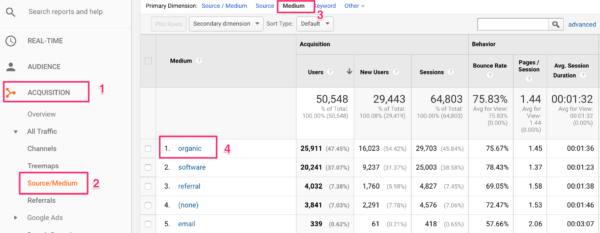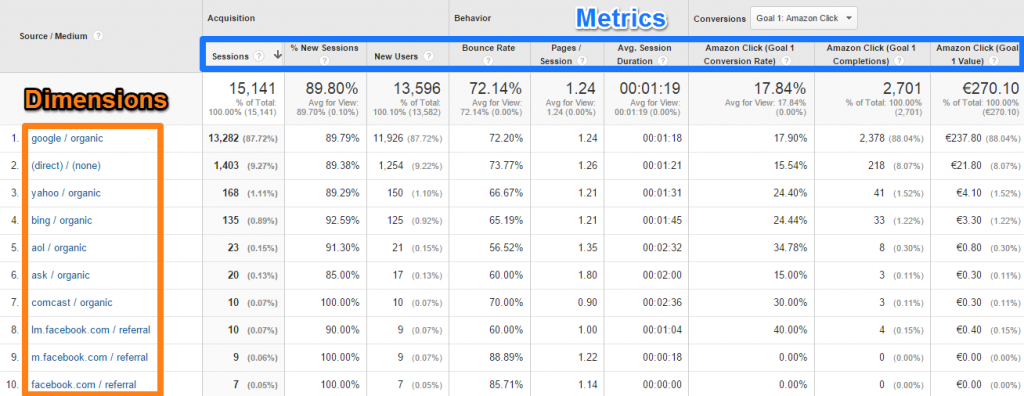Transform Your Analytics Technique With Second Measurement in Google Analytics
By integrating secondary measurements into information analysis, a brand-new layer of insights emerges, losing light on complex user actions and communications. The critical application of additional measurements holds the essential to opening a treasure chest of invaluable information that can change how organizations act and analyze upon their data.
Comprehending Second Dimensions in Google Analytics
Additional measurements in Google Analytics offer extra context to key data by enabling customers to evaluate metrics throughout a 2nd measurement, using much deeper understandings into individual actions and interactions on a site. Secondary Dimension in Google Analytics. While key measurements offer basic information points such as pageviews, bounce rate, and session duration, additional measurements offer a more comprehensive sight by segmenting the key data even more. This segmentation enables customers to assess metrics in combination with another measurement, such as web traffic sources, demographics, or user habits
Benefits of Utilizing Secondary Dimensions
Using additional measurements in Google Analytics uses a calculated advantage by enhancing the depth of evaluation and giving an extra thorough understanding of user communications and behavior on a website. By incorporating secondary dimensions, experts can get beneficial understandings right into the performance of particular sections or variables within their data. This enables a much more in-depth assessment of individual behavior beyond surface-level metrics, allowing for a much deeper expedition of the aspects influencing user engagement and conversions.

How to Carry Out Secondary Measurements
When incorporating second dimensions in Google Analytics, one vital action is to select the appropriate metrics and dimensions to enhance the evaluation process. To apply secondary measurements effectively, begin by accessing your Google Analytics account and browsing to the report you desire to enhance with added information. Once in the record, find the "Second Dimension" button, generally found over the information table. Clicking on this button will certainly open a drop-down menu listing different measurements that can be added to your main measurement for deeper insights.
After choosing the proper second measurement, such as 'Source/Medium' or 'Device Category,' Google Analytics will show the data in a much more thorough layout, allowing you to cross-analyze different aspects of individual habits. Keep in mind to trying out various mixes of primary and secondary dimensions to uncover important patterns and trends that can inform your advertising approaches. By implementing secondary measurements attentively, you can obtain an extra thorough understanding of your internet site or application efficiency and make data-driven decisions to maximize your digital visibility.
Studying Data With Additional Dimensions
Improve your data evaluation in Google Analytics by incorporating additional measurements to dig deeper into customer habits patterns and optimize your electronic advertising strategies effectively - Secondary Dimension in Google Analytics. By adding second dimensions to your key information, you can gain beneficial insights that can help you make notified decisions concerning your site or application performance
Analyzing information with secondary measurements allows you to sector your primary information even more, giving a much more thorough view of customer interactions. For example, these details integrating the key dimension of 'source/medium' with an additional dimension like 'landing web page' can reveal which certain pages are driving website traffic from different resources. This info can be instrumental in fine-tuning your web content strategy or enhancing your marketing campaign to enhance conversions.
Moreover, utilizing secondary measurements allows you to recognize correlations between different metrics, aiding you recognize the impact of various aspects on individual actions. Whether it's analyzing demographics alongside individual interaction metrics or tool groups with conversion prices, secondary dimensions empower you to uncover hidden patterns and patterns that can assist your advertising and marketing initiatives.
Maximizing Efficiency With Second Measurements
To boost the performance of information evaluation and decision-making in Google Analytics, including second measurements is vital to maximizing efficiency metrics and obtaining much deeper understandings right into individual habits patterns. By utilizing second measurements, experts can dig past surface-level information and reveal beneficial relationships that might or else go undetected. Get More Information This optimization method allows companies to tailor their marketing efforts better, recognize locations for enhancement in site usability, and enhance total customer experience.
Additional dimensions offer an even more extensive sight of customer interactions by offering added context to key data metrics. For instance, coupling the main dimension of 'touchdown page' with a secondary measurement like 'gadget category' can disclose whether specific devices are most likely to drive engagement on details landing pages. This understanding can inform responsive layout improvements or targeted advertising methods to boost efficiency.

Verdict
To conclude, the combination of secondary measurements in Google Analytics offers businesses with an effective tool to enhance their analytics approach. Secondary Dimension in Google Analytics. By delving deeper right into individual behavior and communications, online marketers can uncover useful insights that can drive efficiency optimization and improve the general user experience. Leveraging additional measurements enables a more detailed analysis of data, leading to more enlightened decision-making and tailored advertising and marketing efforts
Additional measurements in Google Analytics offer added context to key data by permitting users to examine metrics throughout a second measurement, supplying deeper understandings right into user habits and communications on a website. While main measurements give fundamental information factors such as pageviews, bounce price, and session duration, additional measurements supply a more comprehensive sight by segmenting the key data even more.One of the essential advantages of making use of secondary dimensions is the capability to discover relationships and patterns that might not be instantly evident when assessing information with primary dimensions alone.When incorporating second dimensions in Google Analytics, you can try here one important step is to choose the pertinent metrics and measurements to improve the evaluation procedure. Coupling the key dimension of 'touchdown web page' with a secondary dimension like 'device classification' can disclose whether certain devices are much more most likely to drive involvement on specific landing web pages.
Comments on “Comprehensive Insights Utilizing Secondary Dimension in Google Analytics”